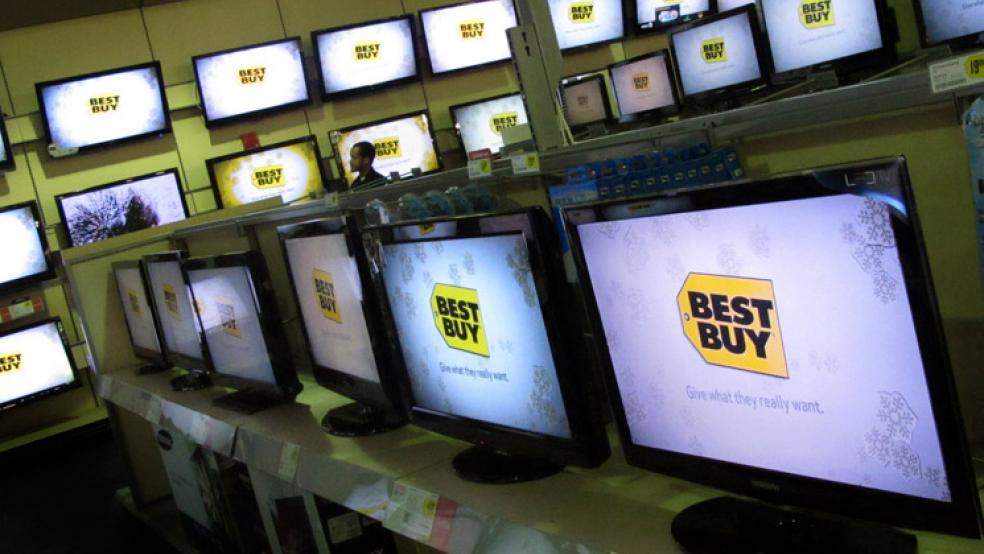Best Buy (NYSE: BBY), widely thought to be circling the drain last year, has been a surprising Wall Street success story in 2013…until today.
Under CEO Hubert Joly, who took over last year, the big box electronics retailer has slashed $390 million in annual costs and matched prices of rivals such as Amazon.com (NASDAQ: AMZN) to combat “show-rooming,” when consumers go to a bricks-and-mortar store to look at products only to buy them later from a web-based retailer.
The stock has been the second-best performer in the S&P 500 this year, soaring more than 250 percent, from $11.85 at the end of 2012 to $43.56 as of Monday’s close.
That turnaround tale hit a bump Tuesday morning, even as the company reported a better than expected profit for the third quarter as a rise in same-store sales for the first time in more than 3 years. Best Buy warned that keeping pace with promotional competition from rivals would cause margins to fall during the crucial holiday shopping season.
Best Buy may have figured out a strategy to compete more effectively with the likes of Amazon.com, but the holiday forecast was a reminder that Wal-Mart and other rivals can also put a squeeze on Joly’s plans. Wal-Mart said Tuesday it would match Black Friday prices from Target (NYSE: TGT), Toys ‘R’ Us and Best Buy on popular toys and electronics starting Friday. Shares of Best Buy fell more than 8 percent Tuesday after the company’s fourth-quarter warning.
“You can only cut costs for so long,” said Brian Yarborough, an analyst with Edward Jones, who has a neutral rating on the stock, in an interview.” We are concerned that they can’t get consistent sales growth.”
Joly is credited by Yarborough and other analysts for bringing stability to a company that had been making headlines for all the wrong reasons. For instance, former CEO Brian Dunn was fired last year for having an affair with a female subordinate. Founder Richard Schulze was ousted from the board for failing to notify his fellow members about Dunn’s relationship.
Schulze later tried to buy the company but abandoned the idea and returned to Best Buy this year as chairman emeritus. Schulze has also expressed support for Joly, who has gotten kudos for revamping Best Buy’s outdated website, among other things.
Joly’s focus on the bottom line has paid off, at least through the first three quarters of the year. During the most recent quarter, Best Buy earned net income of $54 million, or 16 cents a share, reversing a year-ago loss of $10 million, or 3 cents a share. Excluding one-time items, profit was 18 cents, beating Wall Street expectations of 12 cents. Revenue fell 0.2 percent to $9.36 billion, a hair under the level analysts had expected.
David Strasser, an analyst with Janney Montgomery Scott, says the latest quarterly results shouldn’t cast doubt on Joly’s turnaround.
“The fact that they are facing the threat head on is a bonus and a positive,” writes Strasser in an email.
Like other retailers, Best Buy also faces a challenging economic environment that may cause consumers to be cautious in their spending.
“It’s a competitive environment and it’s going to continue to be a competitive environment,” Yarborough said.
Heading into the holiday season, economists and executives at some retailers such as Wal-Mart have noted that consumers are keeping a tight grip on their wallets. The University of Michigan’s Consumer Sentiment Index is at its lowest level since 2011. Even more troubling for retailers is a recent National Retail Federation (NRF) survey, which found that 80 percent of shoppers plan to spend less for the holidays.
Unfortunately for retailers, some view the NRF survey as being overly optimistic. Morgan Stanley recently argued that the holiday season will the worst since 2008.
Top Reads from The Fiscal Times:




